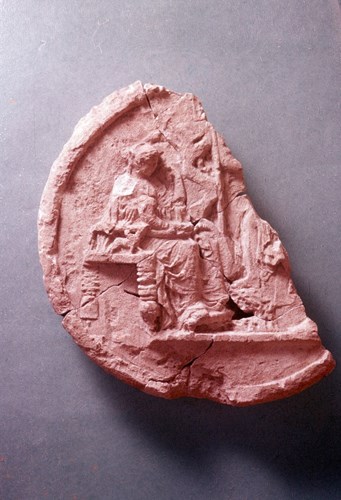Despoina and Areion
The search for Persephone carried Demeter far and wide across the land. At some point she found herself in Arcadia in the Peloponnese. Poseidon, the god of the sea, had developed an ardent passion for Demeter and decided to pursue her. The goddess attempted to flee his unwanted attention and transformed herself into a mare and mixed with the mares of Oncius, the son of Apollo and a local ruler famous for his herd of horses. Poseidon, not to be outwitted, changed into a stallion and mated with Demeter. From their union came a horse called Areion. Demeter was none too pleased and only consorted with Poseidon "in the likeness of a Fury''. Her avenging anger could be terrible, but soon she decided to bathe in the River Ladon to wash away her wrath. Arion grew up to become a fabulously fast horse with a distinctive black mane. He participated in the war of the Seven against Thebes, where he saved the life of King Adrastus, as well as in Heracles’ campaign in Elis and in his fight against Ares' son Cycnus.

Poros disc with Demeter and Poseidon, sculpture, American School of Classical Studies / Athenian Agora Excavations © American School of Classical Studies at Athens, Archives, Athenian Agora Excavations
Pausanias claims that the divine union also produced a daughter, but her name could not be divulged to the uninitiated. Among them she was known as Despoina, a word derived from *des-potnia, “lady or mistress of the house”. She was worshipped in a sanctuary at Lycosura, west of the town of Megalopolis. There was a statue of Despoina and Demeter sitting on a throne. Demeter carried a torch in her right hand and laid her other hand upon Despoina, who had a staff on her knees and a box in her right hand. The two goddesses were accompanied by Artemis and Anytus, a Titan who brought up Despoina. The sculptural group was made by Damophon and the surviving fragments can be seen in the National Archaeological Museum of Athens.
Despoina was much revered by the Arcadians, who brought into the sanctuary the fruit of every cultivated tree except the pomegranate. They celebrated Mysteries near the sanctuary and sacrificed many victims to Despoina. The rather barbaric sacrifice consisted of every man chopping off a limb of the sacrificial animal he had brought rather than cutting the throat of the victim as was the case in normal sacrifices. Pausanias declared that Despoina was one of the deity’s many surnames, in parallel to the use of Kore for Persephone.





